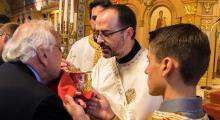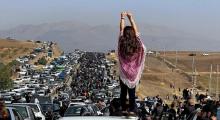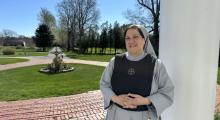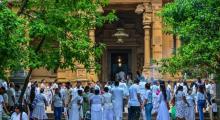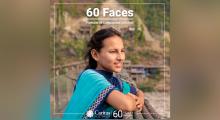Issued by the Catholic Center for Studies and Media - Jordan. Editor-in-chief Fr. Rif'at Bader - موقع أبونا abouna.org
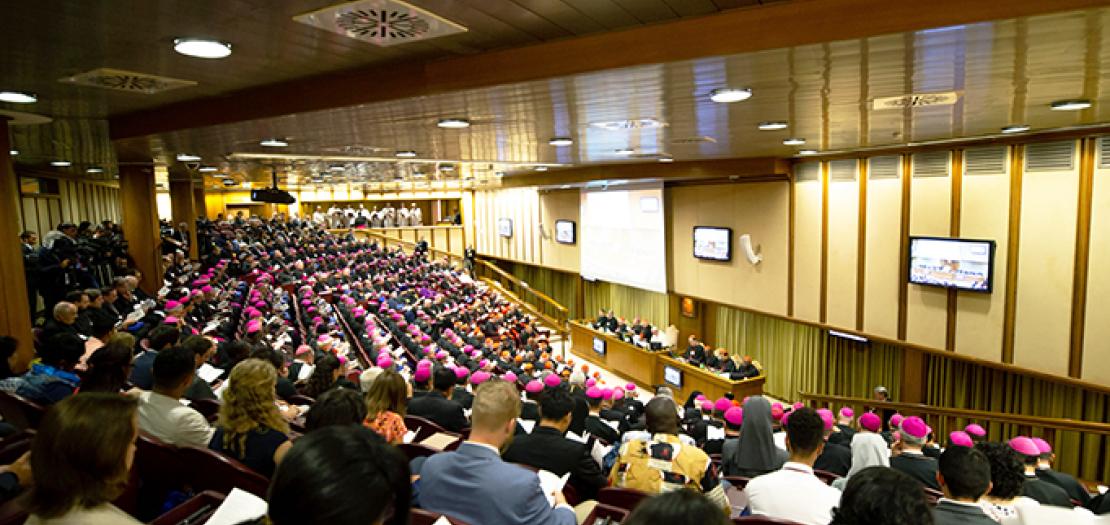
Following is the Vatican-provided intervention of Mr. Safa Al Abbia, member of the Chaldean Church, Iraq, who is serving as an auditor in the Synod of Bishops, which those present agreed had received the most applause the whole Synod:
Holy Father, Your Eminences, Dear Friends,
Greetings from Mesopotamia, “the wounded Iraq”.
I’m a 26-year-old Iraqi dentist and I’m a Chaldean Christian.
Christians in Iraq go back to the 1st Century. Throughout their history, they have been victims of persecution because of their faith. This happened especially after 2003.
In my previous participation (twice, here), I was anxious to speak about my homeland, while the on-going discussions were about other important issues, which are different from the reality in Iraq and in other countries of the Middle East.
It certainly is important to talk about the family, sexuality and the social media. However, the main challenge facing young people in Iraq is peace and stability, and the need to live in dignity.
In such difficult circumstances, believers, including young people, are struggling to remain steadfast in their faith, as witnesses to Jesus Christ and to their traditions, values and liturgy. This struggle is obvious given the number of martyrs who have shed their blood in Iraq. More than 1224 Christians have been killed, half of them being young people. An example of this occurred during Sunday Mass in Baghdad’s Syriac Cathedral of Our Lady of Salvation, in October of 2010, which left 58 victims, including two young priests, Fathers Wassem and Thaaer.
There was also the murder of young Chaldean Father Regheed and of Bishop Paulus Faraj Raho, as well as the repeated bombing of a number of churches, including my own. I’ll never forget my friends’ faces when, after Mass, they said “see you next week,” but I never saw them again. They died, burned by a car-bomb. In addition, there are continued threats, kidnappings and killings, based on one’s Christian identity. All this was followed, tragically, by the actions of ISIS terrorists. During the invasion of Mosul and the Nineveh Plains, more than 120,000 Christians were driven out of their homes in one night.
Furthermore, Iraqi young people are suffering from a decrease in employment opportunities, a lowering of the educational level and social values, and the absence of law. As a result of all that they have been through, Iraqi youth are questioning the impact on their life of being Iraqis, the role of God and of the Church, despite the Church’s good efforts to assist.
These conditions have made youth fearful of the future, dissuading them from pursuing the sciences, an education and from marrying. They thought the solution was emigration. From a total of 1.5 million Iraqi Christians in 2003, their number has shrunk to 400,000. And the fear is that they will decrease steadily, and there will come a day when Iraq will be devoid of Christians.
In conclusion, I would appreciate your prayers for Iraq and its Christians. However, I would like to remind all that, in addition to prayers, special attention must be paid not only to youth in Iraq but also in many other countries where Christians are a minority and need support, as do their Churches.
Despite everything, it’s important to mention that we still have in Iraq a wonderful group of young people who live their faith as witnesses of Jesus Christ.
Finally, I have a message from young people for Your Holiness: they hope to see you one day in Iraq!
POPE FRANCIS' SPECIAL ENCOURAGEMENT TO YOUNG IRAQI PEOPLE
On October 13, 2018, Pope Francis gave special encouragement to the young people of Iraq, receiving, at Casa Santa Marta in the Vatican, 26-year-old Safa Al-Abbia, a member of the Chaldean Church and auditor at the Synod on Young People. On learning that he had to leave the Synod because his mother was gravely ill, Pope Francis wished to greet him before he left.
In the course of the audience, in a “particularly affectionate” atmosphere, the Pope gave the young man a Rosary for his mother, reported “Vatican News.”
The Holy Father listened to Safa’s story and addressed a message to Iraqi young people, to be published once he returned to his country. The Pontiff confided that he carries in his heart the Young people of Iraq, conscious of their sufferings. He encouraged them to have confidence in the future, not to be discouraged despite the difficulties of the past and the present, and to entrust themselves to the Lord. Finally, he assured them of his prayers and gave them his Blessing, stated the same source.
Safa’s intervention on October 11 was the most applauded since the start of the Synod of Bishops on Young People. He invited the Pope to visit his country and talked about the daily life of 120,000 Christians of the Nineveh Plains, including abductions, assassinations under Daesh’s menace. He confessed his fear of seeing Iraq emptied of Christians, the main challenge for young people being peace, stability and the right to live in dignity.


